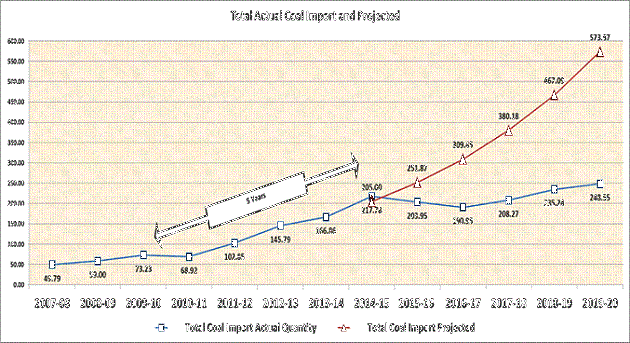By Our Correspondent/PIB
NEW DELHI/BHUBANESWAR: India is currently producing about 729 million tonnes of coal. However, it is a fact that domestic production is not able to meet the demand of coal in the country. India has imported 247 million tonnes of coal last year and had spent 1.58 lakh crore as foreign exchange. Despite India being world’s second largest coal producer and being the 5th largest country in terms of coal deposits, with coal reserves which may last at least 100 years more, the country is unable to produce adequate quantity of coal to meet the requirement of domestic industry and development.
It is the intention of the Government of India to bring faster economic development to the aspiring regions of the country. Since these States are resource rich, harnessing of these resources is critical in the development of these States. Commercial auction of coal mines alongwith transparent measures taken by the Government of India has come at an opportune time to bridge the mismatch between the demand and supply of coal in the country. This will not only provide a huge opportunity for employment in the backward regions but will also save precious foreign exchange to the extent of almost Rs.20,000 crores to Rs.30,000 crores per year.
These reforms will also have an effect on other sectors dependent on coal. With an increase in coal production the positive impact will also be felt on production and processing in Steel, Aluminum, Fertilizers and Cement sector. Coal Sector Reforms introduced ease of doing business while retaining transparency – ushering Commercial Mining of Coal in 2020. Appointed (June 2019) a High Level Committee headed by Vice-Chairman of NITI Aayog to liberalize coal sector while retaining transparency.
This HLC made several important recommendations (October 2019) for coal block allocations and the most important being a paradigm shift wherein coal was not to be viewed as a source of revenue and instead it should be considered as an input to economic growth through the concerned sectors consuming coal. The government should focus on early and maximum production of coal and working towards its abundant availability in the market. Accordingly, it made recommendations to fulfill these objectives in line with changed paradigm. Government accepted these recommendations with certain modifications and initiated several actions.
Relevant provisions of the CMSP Act and the MMDR Act were amended through the Mineral Laws (Amendment) Act, 2020 with a view of ensuring ease of doing business, removing redundancy in provisions and bringing flexibility in allocation. The amendment allowed allocation of blocks for composite prospecting license-cum-mining lease, removed the possibility of restrictive interpretation of the eligibility conditions thereby increasing wider participation in coal mine auctions and providing flexibility to Central Government in deciding the purpose of allocation, removed the restriction in eligibility to participate for certain coal mines, dispensing with requirement of previous approval for grant of mineral concessions in case where allocation of block is made by Central Government and other consequential/ clarificatory amendments.
In additions to change in law, the auction process and methodology was further simplified in 2020. It was decided to auction the coal blocks without restriction on sale and/or utilization of coal. Export of coal was also allowed in accordance with Applicable Law. In order to enable smooth operations, right to exploit coal bed methane (CBM) and minor minerals have been provided. Flexibility was provided to the bidders to manage the coal production schedule depending on their requirement, market scenario etc. and relinquish partially explored mines after exploration. Another major change was to introduce revenue sharing mechanism in auction of coal mines, thereby making the auction more market friendly. Coal gasification has been incentivized in the new commercial mining regime.
With the above changes in law and policy, the auction of coal blocks for commercial mining was launched in June 2020 with 38 blocks in the first tranche. Out of 38 blocks, the auction process successfully completed for 19 blocks in November 2020. The coal blocks have been successfully auctioned with the winning % revenue share ranging from 9.5% to 66.75%. It is important to note here that the floor price in the bid document was stipulated as 4% of revenue share. Total annual revenue generation from the auction is estimated at ~Rs.6656 crore considering production at aggregated Peak Rate Capacity level of ~51 MTPA. Total upfront amount of Rs.262 cr will be received by the States during the financial year FY 2020-21 and the remaining upfront amount of Rs.786 cr will be received by the States subsequently, based on the milestones mentioned in the bid documents.
In the above background it is seen that Import substitution is one of the topmost priorities of the Govt. of India presently. An Inter-Ministerial Committee (IMC) has been constituted for the purpose. Towards the goal of Aatmanirbhar Bharat, the Ministry along with all stakeholders is actively pursuing to achieve the mission of Import Substitution. The impetus for import substitution has been triggered off primarily due to the following:
Coal import in 2018-19 was 235 MT, further risen to 247 MT in 2019-20.Huge outflow of precious foreign exchange (1.71 lakh crores in 2018-19).Abundant coal availability with all time high Stock of 75 MT in different Coal Subsidiaries of CIL as well as to the power.Ambitious production plan of all coal companies.
Fortunately, the country is now blessed with abundance of non-coking coal and the consumers can confidently look forward for substituting their import coal requirement with domestic coal. For promoting import substitution, thrust is being made to offer large quantities of domestic coal through various format of e-auctions so that the consumers are not inclined towards import of coal.
Besides the above, CIL is also giving discounts through waiver of Performance Incentive, coastal TPPs included, to encourage import substitution. Allowing waiver of Performance Incentive charges as a concession for coastal plants towards import substitution would entail benefit to the tune of more than 5% of total annual coal value payments as per provisions of FSA even when minimum committed quantity under FSA is lifted along with import substitution quantity. The benefit on coal cost savings goes up to more than 15% when the entire quantity under FSA is lifted by TPP along with import substitution quantity. The graph below is a depiction of how enhanced production has been able to contain imports to a large extent.
To eliminate substitutable quantities of the import of coal in country, we are focused in our aim to increase domestic coal supplies to the consumers, rationalize coal movements, review certain levies, incentivize domestic coal consumption to distant consumers who are attracted to coal imports for economic reasons and thereby maximizing domestic coal consumption which shall lead to achieving the goal of ‘Atma Nirbhar Bharat’. It is projected that the coal demand will grow from 955.26 MT in 2019-20 to 1.27 BT in 2023-24. To meet this growing demand a coal production plan has been prepared and CIL has been given a target of producing 1 BT coal by 2023-24.
The investment of Rs 44,000 crore by the Coal Companies for coal evacuation infrastructure is likely to go into the development of coal handling plants, ports and strengthening of the transportation chain as we want to minimize the road transportation and use upgraded conveyor belts for transportation.
Commensurate with our Hon’ble Prime Minister’s holistic vision of better Governance to facilitate ‘Ease of living with Ease of doing business’ the ‘Transformative Idea’ of First Mile Connectivity project aims to ease the life of people residing in coal mine areas by reducing traffic congestion, road accidents, adverse effects on environment and health around coal mines and by enhancing coal handling efficiency through employing alternate transport methods like mechanized conveyor system and computerized loading into railway rakes. Coal companies have formulated a strategy to develop an integrated approach for eliminating road transportation of coal in the mines.
This will be achieved by implementing 39 FMC projects with a total capacity of 449.5 MTY. Prior to the implementation of FMC projects from July 2019, CIL had mechanized conveyor system and computerized loading in 19 projects having 151 MTY capacity. After commissioning of these 39 FMC Projects, this capacity shall get enhanced to ~600 MTY by 2023-24. This shall impart various benefits including but not limited to savings in diesel costs, demurrage charges and transportation charges, health benefits etc.
The Ministry of Coal has two large PSUs – Coal India Ltd. (CIL) and NLC India Ltd. (NLCIL) under its administrative control. CIL operates in 7 states and NLCIL in 5 states. CIL is a hard-core coal company with 7 subsidiaries – while NLCIL has ventured into new sectors (power generation, renewables, coal mining). CIL contributes about 80% of India’s domestic coal production and 65% of coal consumption.
Diversification was felt a necessity, especially in the light of climate change debates, diversifying into non-coal, secure new businesses, productively utilize sizeable reserves/funds in their Balance Sheet, fiduciary responsibility towards long-term future of coal-mine workers, leveraging economic growth, particularly in eastern region, need to invest in coal mines and related infrastructure to eliminate substitutable coal imports, support 100 MT coal gasification and likely coal exports.New Business Areas (Diversification) to transform CIL/NLCIL from coal companies to energy companies.Clean Coal Technologies (Technology-related) to provide sustainability to coal business.Coal Mining Projects (Core business) to help achieve 1 Billion Tonne coal production by 2024 and create essential related infrastructure
Talcher Fertiliser plant: Coal Gasification based on high ash coal mixed with pet coke. Investment: Rs 13277 cr. CIL, RCF and GAIL are equity partners (28%) and project will be financed through loan (72%) from banks. Coal Source: 2.5 MT North of Arkapal block in Odisha allocated to TFL for providing coal and pet coke will be sourced from Talcher refinery.
Dankuni Methanol Plant: Coal Gasification based on low ash coal. Investment: Rs 5800 Crs. Project planned through BOO mode and investment will be made by potential investors. Coal Source: 1.5 MTCoal will be supplied from Jhanjhara and Sonepur Bazari Mines of ECL.



























